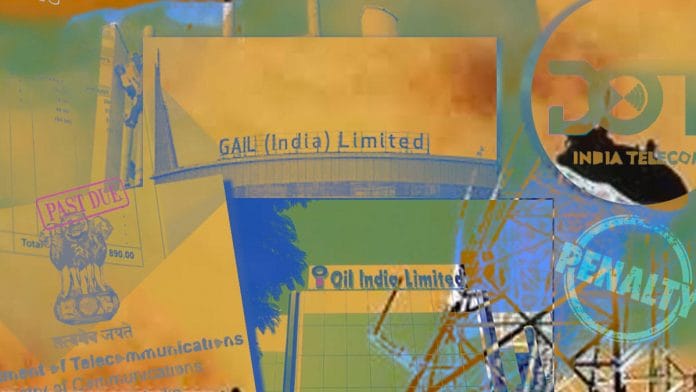New Delhi: The Department of Telecommunications (DoT) is asking GAIL India and Oil India to shell out Rs 2.2 lakh crore in a classic example of one government arm preying on another.
The sum constitutes dues related to adjusted gross revenue (AGR), an important yardstick that serves as the basis on which the government calculates and collects licence fee and spectrum usage fee.
The bill slapped on GAIL India and Oil India is substantially higher than the net worth of these public sector companies — the demand from GAIL India is estimated at Rs 1.72 lakh crore, over three times its net worth, while the bill for Oil India stands at around Rs 48,000 crore, twice its net worth.
The dues include penalties and interest, and, if paid, could throw the firms into financial turmoil.
While GAIL India is a natural gas processing and distribution company, Oil India is an exploration and production company.
A small portion, if any, of their revenues comes from optical fibres leased from the government and laid across their oil and gas distribution networks. These are mainly used for internal purposes.
But the dues they’ve been asked to pay have been calculated as a percentage of their overall revenue.
GAIL India and Oil India say they are not liable to pay these dues to the Department of Telecommunications (DoT) as they are essentially non-telecom firms. However, no respite has been forthcoming from the telecom ministry.
ThePrint approached the DoT for comment but a spokesperson said they had nothing to say about the matter.
The deadline for payment expires 23 January, Thursday.
Also Read: India’s great telecom mess just got worse
An important definition
Private telcos like Airtel and Vodafone, who also owe big sums to the Department of Telecommunications, have approached the Supreme Court for permission to negotiate the terms and timing of the AGR dues.
Last year, the Supreme Court had upheld the DoT’s definition of what constitutes AGR, mandating companies to include non-telecom revenues in it as well.
The government had argued that AGR should factor in all income accruing to a telecom service provider, including telecom and non-telecom businesses. The telcos argued that only income from telecom services should be included in the definition, saying dividend income, interest income on short-term investments and the like were non-operational income.
This argument was, however, rejected.
The Supreme Court ruling forced telecom companies like Airtel and Vodafone to make provisions in their balance sheets to factor in the payments. Meanwhile, non-telecom firms like GAIL India and Oil India also received notices, but they say they are not liable to pay these sums.
“GAIL (India) Ltd obtained ISP (internet service provider) licence in year 2002, for a period of 15 years, which expired in the year 2017. However, GAIL has never done any business under ISP licence. Since no business is done under ISP licence, there is no amount payable,” GAIL India had said in a statement in December.
Oil India has announced its intention to approach the Telecom Disputes Settlement and Appellate Tribunal. It has pointed out that the optical fibre [it took from DoT] is only used for internal communication purposes like monitoring wells and production control.
AGR demand ‘a joke’
Analysts and industry experts have questioned the demands imposed by the Department of Telecommunications, terming them “untenable”.
Former ONGC chairman R.S. Sharma told CNBC TV18 that the AGR demand on firms like GAIL and Oil India was a “joke”.
“These companies are not into the telecom business. They got these licences to specifically meet their business needs. Without any delay, the government should come out with a clarification that these PSUs will be exempted from payment of AGR dues,” he said.
“The Department of Telecommunications has no logic and no justification to collect these arrears from these firms.”
He pointed out that these firms added value to the economy.
“These companies will sink without any trace (if made to pay these dues),” he added.
A research report by Mumbai-based Emkay Global Financial Services had in December pointed out that GAIL’s core gas-petrochemicals-LPG business revenue was in no way related to fibre-leasing income.
It had noted that the demand was “untenable and also non-fundable considering GAIL’s net worth is Rs 44,100 crore”.
Also Read: Supreme Court orders telecom companies to pay Rs 92,000 crore to govt







Isn’t Jio a subsidiary? Maybe court should attach revenue of Jio’s parent company for AGR calculation?